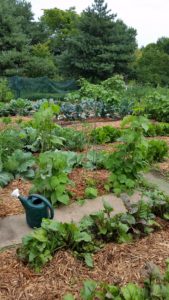A couple of months ago our friends, Rick and Lisa, asked my husband and me if we would like to participate in a community garden with them. If we did so, it would bring the total number of people with experience growing vegetables to zero, but we liked the idea and decided to give it a try. The four of us met at our plot late in the spring to begin planning what we would grow, and over the next several weeks, we sowed seeds and planted seedlings with great hopes for an abundant harvest.
Even though it would take time and hard work, the idea of a biggish garden was appealing to me. It felt really…healthy, and as a practitioner of Chinese medicine, it completely resonated with what I do. Growing your own food is beneficial on so many levels—here are a few things to consider:
 -When you eat fruits and vegetables from your garden, you’re eating according to the seasons. In Chinese food therapy, each food has an inherent temperature and action, and the plants that grow during each season have a purpose. For example, tomatoes, cucumbers, and melons which become ripe during the heat of the summer are energetically moistening and cooling; and winter squash and root vegetables that are available later in the fall are more substantial to help you build energy for the coming winter. Basically, what’s growing now is what you’re supposed to be eating.
-When you eat fruits and vegetables from your garden, you’re eating according to the seasons. In Chinese food therapy, each food has an inherent temperature and action, and the plants that grow during each season have a purpose. For example, tomatoes, cucumbers, and melons which become ripe during the heat of the summer are energetically moistening and cooling; and winter squash and root vegetables that are available later in the fall are more substantial to help you build energy for the coming winter. Basically, what’s growing now is what you’re supposed to be eating.
-In cultivating your own vegetables, your diet automatically becomes locally grown. In Chinese medicine, you are considered to be part of your environment, so the specific plants that thrive in your locale are what’s healthiest for you. In addition, home grown food doesn’t need to be picked early so it can ripen during the long road trip to your grocery store.
-Growing your own garden keeps the chemicals off your plate. In Chinese medicine, one source of illness is eating food that has been wrecked. Thousands of years ago that meant food that has spoiled due to lack of refrigeration. Today that means eating food that has been doused with pesticides, fungicides and chemical fertilizers. In your own garden, you have control over what is used or not used on your plants. It certainly beats trying to figure out which vegetable is “cleaner” at the grocery store.
-There is something elementally satisfying about picking a vegetable that you’ve grown yourself, taking it home, and eating it. It couldn’t be any fresher and it flat out tastes delicious.
-Gardening is a good way to balance what the Chinese call the work/rest cycle. I have sore muscles from pulling weeds and hauling watering cans to prove that an hour spent in the garden is an hour of stellar exercise. And I sleep like a baby at night.
-Much of the theory behind Chinese medicine is based on patterns in nature. In addition, research abounds on the health benefits of spending time outdoors. Watching your garden grow and ripen provides you with an intimate relationship with Mother Nature. It’s slow and patient and incredibly satisfying.
-You don’t need a huge garden plot. You can grow vegetables and herbs in pots, planters, or a small patch of earth in your back yard. It’s not too late to throw some lettuce or arugula seeds into a pot, and in a few weeks, pick at will. You can try square foot gardening , which is a concept where you grow a lot of food in just a square foot or two of container space. For help getting started, check out The Garden Primer or The Everything Small Space Gardening Book.
-Now that we are regularly bringing home very large loads of vegetables, preparing them has become a bit of a challenge. I just bought The Gardeners Community Cookbook, which has recipes for just about anything you can pick from a garden. I also like Moosewood New Classics (or anything from Moosewood’s Mollie Katzen) and the Kitchen Garden Cookbook.
Over the weeks that our garden has been growing, we have learned a number of valuable lessons. Early on, we had to put up a fence to keep critters from eating our plants. We learned what plants thrived and when to pick before it bolts and becomes too bitter to eat. After weeding until our shoulders and backs ached, we learned that a little mulch would go a long way in keeping the weeds down. The end result is that we’ve been eating kale, lettuce, broccoli, radishes, and a little spinach, with the promise of much more to come!



